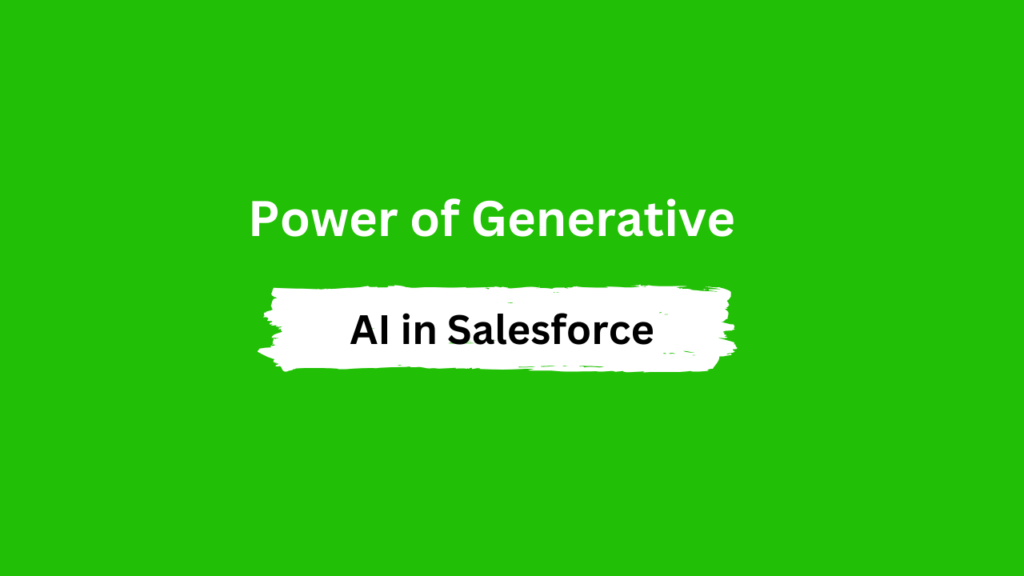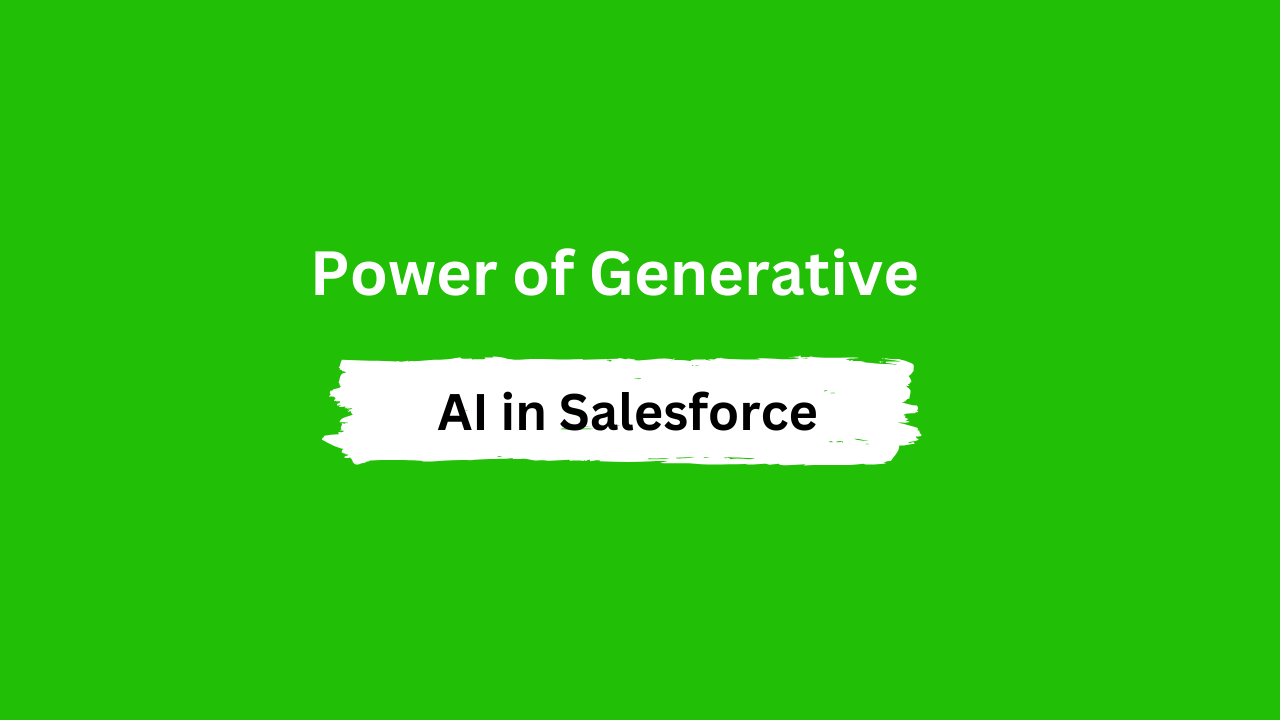Power of Generative AI in Salesforce

Generative AI is a type of AI that generates output from the input provided to it by the user. Generative AI can learn and improve automatically without needing human help, to be more precise; for example, if a user is providing input that “give me the image of the cat or generate the image of the cat,” at that time, the AI will go through stuff and all the images of the cats around and based on that it will create new cat image for us and also it will add all the features according to user’s requirement.
Generative AI also updates itself from the feedback we provide. For example, if we ask AI to generate an image of a cat, and the picture given in the output doesn’t look like a cat, and you provide specific feedback for that, it will learn from your feedback and will update its output better than the previous one.
Generative AI differs from Adaptive AI:
Generative AI is different from Adaptive AI. Adaptive AI focuses on learning and adapting from data to enhance decision-making and process optimization.
Generative AI include:
- Machine Learning techniques such as:
- Deep learning, Neural networks, GANs, VAEs, and LLMs.
- Generative AI is used in Image synthesis, Text generation, and Video prediction.
Generative AI works:
It works on two main aspects
- Generative Adversarial Networks (GANs)
- Variational Autoencoders (VAEs).
How AI is revolutionizing the world of Salesforce?
Are you curious about how AI is revolutionizing the world of Salesforce? Let’s dive into the fascinating ways in which AI is being utilized in Salesforce to boost productivity and enhance customer experience.
Salesforce Einstein:
Salesforce introduced Einstein in 2016, an AI-powered feature set across its various Clouds like Sales Cloud, Service Cloud, Marketing Cloud, etc. It included capabilities such as predictive lead scoring, automated email responses, and predictive analytics to help users make data-driven decisions.
Einstein Vision:
Einstein Vision was introduced in 2017, to bring image recognition capabilities to Salesforce. It enabled users to build and train custom image recognition models for tasks like; identifying products and objects within images.
Einstein Voice:
Salesforce introduced Einstein Voice in 2018, leveraging natural language processing (NLP) for voice commands and transcriptions. This allowed Salesforce users to interact with Salesforce using voice commands and receive insights through natural language interactions.
Integration with IBM Watson:
Salesforce collaborated with IBM Watson in 2018, to integrate advanced AI capabilities into its offerings. The main purpose of this partnership was to enhance customer relationship management (CRM) by leveraging IBM’s Watson for deeper insights and cognitive analytics.
Einstein Bots:
Einstein Bots were introduced in 2018, to automate routine customer interactions using chatbots. These bots could manage common queries, freeing up human agents to focus on more complex tasks.
Acquisition of Tableau:
Salesforce’s acquisition of Tableau was in 2019 to strengthen its analytics capabilities. Tableau’s advanced analytics and visualization tools enhanced Salesforce’s AI offerings, providing users with powerful insights.
Einstein Analytics:
Salesforce introduced updates to Einstein Analytics in 2020, bringing more sophisticated analytics and machine learning capabilities to help users uncover insights, predict outcomes, and make smarter decisions.
Hyperforce:
Salesforce’s Hyperforce initiative in 2020, is not AI-specific and emphasizes the importance of cloud infrastructure in supporting AI and machine learning workloads at scale.
Einstein Automate:
Salesforce announced Einstein Automate in 2021, a set of tools and services aimed at automating workflows and business processes. Einstein Automate includes capabilities such as Flow Orchestrator and MuleSoft Composer for no-code and low-code automation.
Incorporation of External AI Solutions:
Salesforce has integration of external AI solutions through its AppExchange marketplace, allowing users to leverage third-party AI technologies seamlessly within the Salesforce environment.
Einstein GPT:
Einstein GPT is a super-smart assistant that helps people using Salesforce. It uses two kinds of brains:
- Salesforce’s Smart Brain: It is like the secret sauce made by Salesforce. It helps the assistant understand and work with your company’s information in Salesforce.
- OpenAI’s ChatGPT Brain: It is great at understanding and talking in a way that feels natural, like chatting with a helpful friend.
With your own super-secret brain, Einstein GPT is cool with that too! It can work alongside your special brain to make things even more amazing.
Imagine this – you’re sitting in front of your computer, trying to find the answer to a burning question, but you don’t have the time or patience to sift through countless search results. Well, that’s where your trusty AI-powered assistant (Einstein GPT) comes in! By simply asking it a question in plain English, you’ll get a tailor-made response that’s both smart and efficient. It’s like having a genius helper right at your fingertips – now who wouldn’t want that?
Want to learn more about Salesforce GPTs?
Well! Here is a guide for you!!!
Sales GPT:
A super tool that makes your website a lead-catching wizard. It checks out the leads and hands them over to the right people in a flash.
Features of Sales GPT :
- Lead generation:
It turns a website into a lead-generation machine
- Lead qualification:
It quickly qualifies and passes leads to reps - Personalized emails:
It generates personalized emails automatically - Sales coaching:
It provides personalized coaching and insights - Team collaboration:
It keeps the entire team connected
Service GPT:
It is a game-changer for organizations seeking to elevate service experiences across the board, extending from contact centers to on-field operations—all while optimizing costs.
This super tool makes talking to customers a breeze:
Service Replies:
It works like an instant-reply wizard. It quickly generates personalized responses for customers using the newest info. It means problems get solved faster and there are fewer mistakes. Happy customers all around!
Work Summaries:
Think of it as a case superhero. It takes all the details and history and turns them into easy-to-understand summaries. So, when Service agents jump in, they get the whole picture fast and can save the day quicker.
Knowledge Articles:
It auto-generates and updates articles based on the latest real-time data from support interactions.
Mobile Work Briefings:
It prepares field service teams for every appointment by summarizing critical information before they arrive, helping them work more efficiently.
Marketing GPT:
Think of these tools as your creative sidekick for making emails and commerce a breeze:
- Email Content Creation:
Creates personalized and special emails. - Segment Intelligence for Data Cloud:
Acts as a data detective, analyzing different groups (segments) to understand their preferences. - Rapid Identity Resolution, Segmentation, and Engagement:
Quickly identifies and categorizes individuals, ensuring tailored engagement.
- Intelligent Segment Creation:
Creates groups based on various criteria. - Smart E-mail Content Development:
Develops attention-grabbing and engaging email content. - Typeface Generative AI Content Platform:
Generates stunning AI-driven content with perfect typefaces. - Goals-based Commerce:
Assists in setting and planning goals for a successful business strategy. - Dynamic Product Descriptions:
Crafts irresistible product descriptions. - Commerce Assistant:
Acts as a personal assistant, guiding through the entire commerce process.
Commerce GPT:
It is a revamped version of Salesforce Commerce Cloud that uses Generative AI to personalize shopping experiences for customers. It delivers an AI-connected user interface that accelerates new storefront creation and guidance toward goals. Commerce GPT is your magical assistant for business:
- Increased Customer Engagement:
It’s just like a personal shopper for each customer. Commerce GPT creates special experiences by suggesting products, improving search results, and making checkout a breeze. Result? Customers are super happy, and sales shoot up!
- Improved Customer Satisfaction:
Your support superhero! It helps customers by answering questions, solving issues, and suggesting cool products. This means happy customers who stick around.
- Tableau Pulse:
Your analytics autopilot. Tableau Pulse brings automation to analytics, making it faster and more efficient. - Data Cloud Integration:
Imagine all your data working seamlessly together. Data Cloud integration ensures that different data sources connect smoothly, providing a unified and comprehensive view. - Reduced Costs:
Meet your cost-saving wizard. Commerce GPT does the boring stuff like creating promotions, writing product descriptions, and answering routine questions. This leaves businesses more time to focus on big dreams and making more sales. Efficient and cost-effective!
Tableau GPT
As part of Salesforce’s business intelligence updates:


